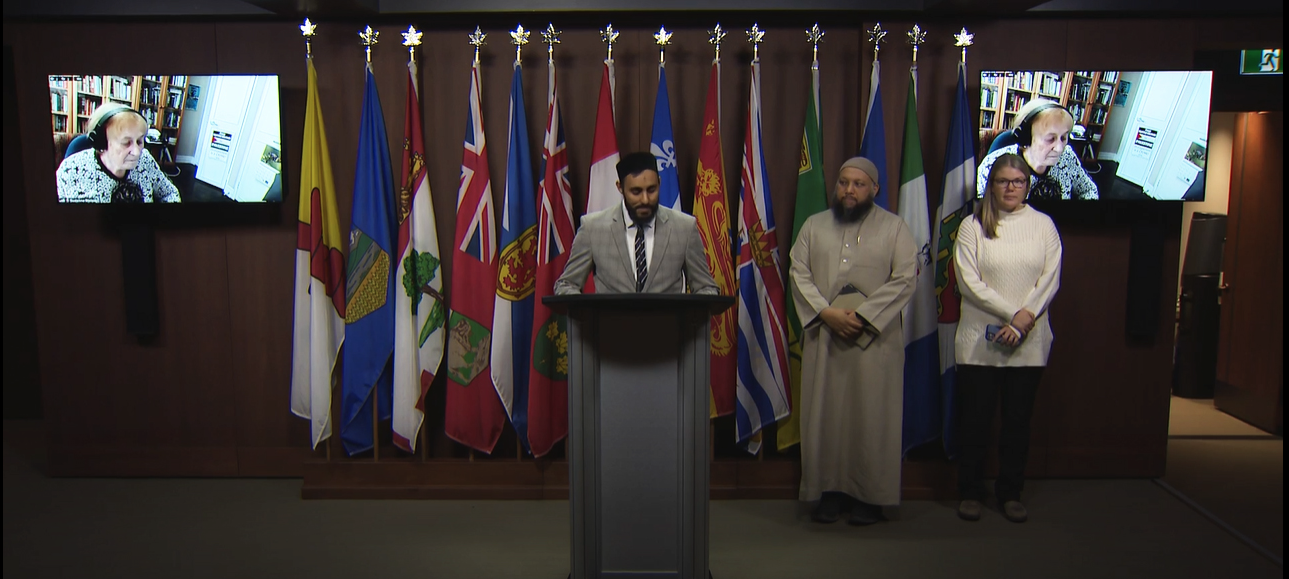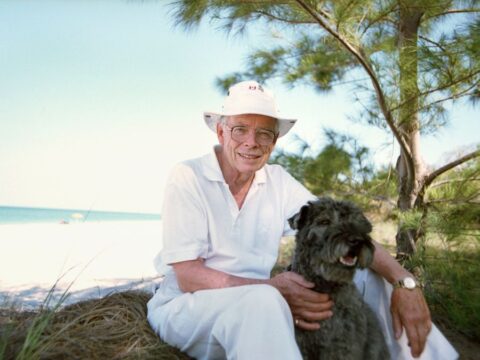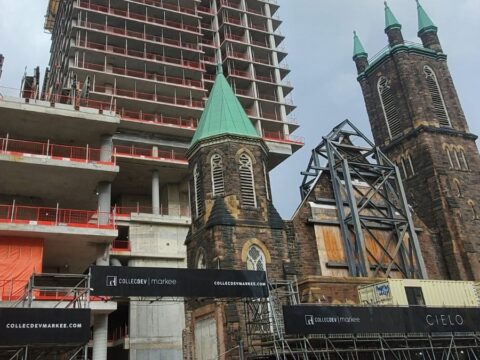Days before retired United Church minister Rev. Marianna Harris and her husband George Bartlett were set to travel to Israel and Palestine for a 10-day visit in October— with 21 other United Church people — Hamas went on a rampage of terror in Israel, murdering and kidnapping civilians. The cancelled trip would have been Harris’s seventh such pilgrimage and the third she had led.
Harris, who divides her time between Toronto and Vancouver, is a member of the United Network for Justice and Peace in Palestine and Israel (UNJPPI). The Hamas attack’s aftermath, including a punishing military response by Israel, leaves her and many others struggling to find hope for peace.
You may unsubscribe from any of our newsletters at any time.
As the war escalates, The United Church of Canada is trying to find a middle ground. Its first public statement, soon after the Hamas attack, mirrors one from the World Council of Churches (WCC) calls for a ceasefire by both sides and “condemns the attacks launched on communities in southern Israel by Hamas, and the ongoing daily violence meted out against Palestinians by Israel’s deepening occupation in Palestinian territories.”
Richard Marceau, vice-president and general counsel for the Centre for Israel and Jewish Affairs (CIJA), who attended last summer’s General Council meeting as an interfaith guest, is not impressed. “I think that the church has shown that it has lost its moral compass,” he says. “Because any reaction that does not strongly condemn the massacre . . . is wrong from the get-go. If you think the Jewish community will ever listen to lessons from them, when pure evil is not being called out clearly, you are living in a different universe.”
CIJA released a statement along with six other Jewish diaspora groups saying, “We stand with Israel as it defends itself against the war launched by the Iranian-backed Hamas terrorist organization.” The statement goes on to call Hamas’s actions “clear war crimes that must be universally denounced, just as Israel’s right to defend itself must be universally supported.”
The Canadian Independent Jewish Voices, a longtime critic of Israeli policies toward Gaza, stated in its first response to the Hamas attacks that, “Attacks against civilians are in violation of international law.” It states that the solution to violence lies in addressing root causes “and that requires supporting Palestinian-led movements to confront and resist Israeli apartheid, as well as pushing governments like Canada to oppose Israeli crimes against humanity.”
Asher Kirchner, part of IJV’s steering committee and an active member of a Reform Jewish synagogue in Edmonton, says Israel’s actions in the West Bank have “gone way beyond apartheid now; we’re talking about ethnic cleansing and possible genocide.” But he says Hamas’s deadly rampage in Israel must also be condemned.
“Some segments of the Palestinian solidarity community, of the left generally, have been inclined to minimize the horror of what Hamas did and to see it as an act of liberation or decolonization. I think that’s a terrible mistake because if the Palestinian solidarity movement can’t condemn civilian deaths carried out by Hamas we lose all credibility in condemning Israel when it does it. It needs to come from a principled stance.”
A few days after the Hamas attack, The United Church of Canada joined ecumenical partners in KAIROS Canada in a statement that condemned the violence, “particularly against Israeli and Palestinian civilians, which constitutes a war crime,” adding that “we lament the loss of Palestinian voices for peace in international media that fails to distinguish between Hamas and Palestinian civilians.” The church wants people in Canada to know neither they nor their partners support terrorism.
As many in the United Church know, the denomination’s policies or statements on Israel and Palestine have often resulted in anger from both Muslim and Jewish groups in Canada. Even responses to tragedy can have subtle overtones and implications for interfaith relations.
So what can United Church people do to help now, amid an avalanche of media information and disturbing video clips?
More on Broadview:
- Jewish-led vigil in Toronto mourns deaths in both Israel and Gaza while calling for ceasefire
- Proposal aims to change tone of Israel-Palestine discussion in the United Church
- 3 faith leaders on why the Palestine-Israel conflict is not a religious one
Patti Talbot, General Council Office’s team lead for global partnership, says church partners ask first for prayers, “for Israelis and Palestinians, especially those grieving the loss of loved ones, and those anxious for loved ones injured and/or held hostage.” Beyond that, they’re calling for a ceasefire, a humanitarian corridor, the release of hostages, adherence to international law, an end to the Gaza blockade and “for the international community to immediately address root causes of the conflict that result in repeated outbreaks of violence that serve to deepen hatred and grievances.”
To help provide immediate relief to Gaza and the West Bank, Talbot says the United Church is raising funds for food aid through the WCC-related ACT Alliance (Action by Churches Together) and the Humanitarian Coalition of the Canadian Foodgrains Bank.
Once a humanitarian corridor is open to Gaza, ACT plans to deliver food, water, medicine, health and sanitation supplies, plus counselling.
But what about hope? Longtime Toronto-based Middle East church peace activist Barbara Lloyd, sees “grounds for hope” in “the voices of leaders and groups like Sabeel Ecumenical Palestinian Liberation Centre, who continue to speak the gospel of life, justice and peace to the people and the world.”
Sabeel, a United Church global partner in Palestine and Israel, holds online gatherings or worship twice a week. A Service of Lament less than a week after the Hamas attack on Israel drew 500 participants from around the world.
Rev. Naim Ateek, a Palestinian Anglican priest and founder of the Jerusalem-based Centre, told the gathering that both Sabeel and Hamas began in 1987, but Sabeel chose the way of non-violence.
“As Christians, we chose the way of non-violence because we believe it is the way of Jesus,” Ateek said. “The way of nonviolence respects and protects the humanity and the human dignity of other people. It even protects the dignity of our enemies.”
Rev. Steve Berube, minister at St. Paul’s United in Riverview, N.B., served as an ecumenical accompanier in Bethlehem in 2013 and 2016. The volunteer position involves accompanying Palestinians as they move around Israel and the West Bank, and through their presence, providing Palestinians some safety from harassment or harm by Israeli soldiers or settlers.
He says “Hamas has committed horrific war crimes. Those who are responsible need to be tried by the International Court of Justice.” But for Palestinians and their church supporters, “non-violent action is the only way forward.”
“My only hope is that people will learn more about the situation faced by Palestinians…that people will seriously ask why so many reputable organizations have named Israel as an apartheid state.”
Keith Simmonds, a diaconal minister at Central Okanagan pastoral charge in Kelowna, B.C., was part of a group that tried to persuade the United Church to adopt the Boycott, Divestment and Sanctions Movement and to name Israel as an apartheid state. He was also an ecumenical accompanier in the West Bank in 2019 and 2020. He says even three years ago Palestinians “knew at some point that it was all going to blow up. And they asked us passionately to come home and talk to people, talk to our government and talk to our churches so that other options could be opened up…. Personally, I feel I failed utterly in that.”
The United Church’s General Council did agree to fine-tune a principles-based way of deciding how its justice work would be done. It is still a work in progress and likely won’t be finalized until 2025.
For Marianna Harris, raising awareness around Palestine and Israel will continue despite the cancellation of this fall’s tour. She hopes to organize another in the future.
In the meantime, she says, “We can’t be silent, and we need to dig down and find what is really going on…. We need to be concerned about everybody, not just ‘our people.’”
***
Mike Milne is a writer in Owen Sound, Ont.















Hi to Mike Milne and thanks for bringing together in Broadview the voices and actions of our church leaders in the world’s current humanitarian dilemma.
Bravo, Broadview! Your even handed coverage is always outstanding and this common sense article presents a model approach for humane justice.